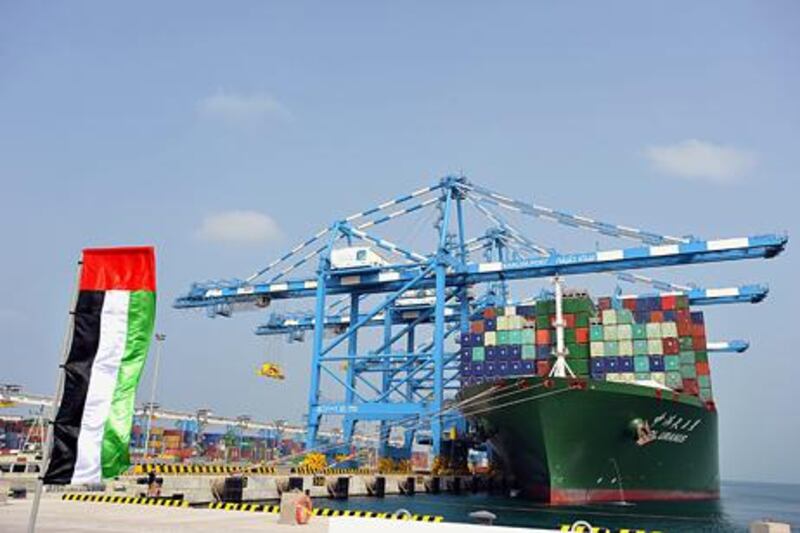Khalifa Port opened for business yesterday as the capital took a major leap forward in its pursuit of industrial diversification.
Sheikh Khalifa, President of the UAE, and other top government officials attended the inauguration some 40 years after the opening of Abu Dhabi's first port – Mina Zayed. That was credited with spurring growth and development in the UAE just after the country's birth in 1971.
Khalifa Port marks the start of another phase in the country's development as it increasingly diversifies its economy away from hydrocarbons and towards the development of value-added industries.
The time and date of the opening is perhaps particularly auspicious – 12 noon on the 12th day of the 12th month of 2012.
"Mina Zayed last year hit its capacity. It was completely full," Tony Douglas, the chief executive of Abu Dhabi Ports Company (ADPC), the entity in charge of ports, said.
"Mina Zayed is a destination port: 95 per cent of what comes into Mina Zayed will normally stay within the emirate of Abu Dhabi. Because logic tells us there was no capacity to grow any further, and given the growth in demand, Mina Khalifa was essential in being able to maintain growth."
The deepwater port, situated 5 kilometres offshore, is the only semi-automated terminal in the region and is designed to service the next mega container ships from all over the world.
Mr Douglas pointed out that the supertanker from China currently sitting in Khalifa Port would not have made it into even the channel of Mina Zayed.
Khalifa Port will initially be able to handle 2.5 million TEU (twenty foot equivalent units) containers and 12 million tonnes of general cargo a year. By 2030, it will be able to process 15 million TEUs and 35 million tonnes of general cargo yearly.
Adjacent to the port lies the Khalifa Industrial Zone Abu Dhabi (Kizad), slated to become one of the largest industrial zones globally, covering 417 square kilometres.
Its development plays a fundamental part of the Abu Dhabi government's 2030 plan of economic diversification and is designed to attract companies involved in the manufacture of steel, aluminium, engineered metals, pharmaceuticals, petrochemicals, paper and food, as well as logistics.
There is 28 sq km of leasable space in the development, a quarter of which is already rented by tenants. Emirates Aluminium was one of the first companies to set up at Kizad.
A total of 53 companies are waiting for their final plans to set up in Kizad to be approved; six companies have already started constructing their facilities and a seventh is expected to start soon.
Companies that have taken leases at Kizad include Brazilian Foods as well as three companies in the aluminium sector: Cast Aluminium Industries, Talex and Al Braik Investments.
ADPC officials point out that low operating costs, ease of doing business and excellent logistics infrastructure are three key points making the industrial zone especially attractive for companies.
"Since the start, we have worked with the government [regarding visas and other necessary bureaucracy] with the aim of specifically cutting the approval time by almost half," said Khaled Salmeen Al Kawari, the chief executive of Kizad.
He said that Brazilian Foods had benefited from that. "The UAE is our main market but market research shows there are a number of countries including India, the United Kingdom, the United States and Germany that are attracted to these propositions."





